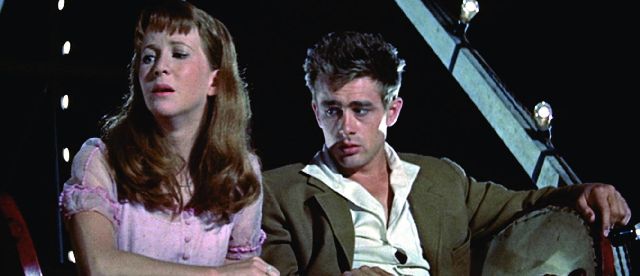East of Eden (1955) 
“Of what a girl did . . . what a boy did … of ecstasy and revenge!”

Director: Elia Kazan
Cast: James Dean, Raymond Massey, Julie Harris
Synopsis: In the Salinas Valley, in and around World War I, Cal Trask feels he must compete against overwhelming odds with his brother Aron for the love of their father Adam.
WARNING! This review contains spoilers!
East of Eden was the movie that propelled 24-year-old James Dean to stardom after just one previous (uncredited) movie role and a four-year apprenticeship in TV. It’s not difficult to see why he would connect so completely with a teenage audience – he captures practically every moody teen affectation with his performance here, and has brooding good looks as well – but his performance is a little too mannered for my liking, as if Dean was simply amplifying all those twitchy little mannerisms Marlon Brando had introduced to audiences just a few years before. Moments of high drama, during which Dean scales the heights of overwrought emotionalism, are particularly difficult to watch without wondering why a director like Elia Kazan, who had done so well at regulating Brando’s performance in On the Waterfront, failed so badly to rein in his young star.
The year is 1917, the place Salinas, a small town on the California coastline in which dwells young Cal Trask (Dean), with his older brother, Aron (Richard Davalos) and father, Adam (Raymond Massey). Mother (Jo Van Fleet) has been dead some years, according to Adam, but Cal has learned that not only is she still alive, but she’s a successful businesswoman and manageress of a bordello just fifteen miles away in the neighbouring town of Monterey. She’s the veiled woman we see Cal doing such a bad job of surreptitiously following in the film’s opening scenes. A difficult reunion between them follows, during which Cal learns the truth about her split from his father, essentially because of his goodness, as illustrated by his adherence to the teachings of the bible.
With America on the brink of entering the Great War, and his father losing his money in an ill-fated refrigeration business, Cal borrows $5,000 from his mother in order to invest in the commodities market for beans with local businessman Will Hamilton (Albert Dekker). The investment pays off, and Cal decides to give the money he earns to his father. But Adam’s reaction to this unexpected birthday gift is far from what Cal expected.
East of Eden is an adaptation of John Steinbeck’s novel, which was an updating of the biblical story of Cain and Abel. Apparently, Oscar-nominated writer Paul Osborn discarded much of the novel’s sub-plots to focus on the relationship between Cal and his family, and his brother Aron’s girlfriend, Abra (Julie Harris), and we can only give thanks that he did, because even pared down to this one strand, the movie feels a little too bloated for comfort. At its heart, the film is an exploration of Cal’s quest to win his father’s love over that of his brother, who he feels has always been Adam’s favourite. Truth be told, he’s not wrong; and although Adam does try to make some kind of connection with his son, they have already grown so far apart that they both find it impossible to make any kind of progress. It’s as if each speaks a language which is incomprehensible to the other. However, Caleb’s still a teen, and he lacks both the means of expression and the articulation of thought required to release the emotional pressure within him. Likewise, Dean seems only capable of transmitting these ideas in a literal sense that leaves much of what he’s getting worked up about as much of a mystery to us as it is to Adam.
The truth be told, Caleb comes across as something of a whiny little brat for whom any perceived slight from his father is enough to trigger a tantrum. He wants unconditional love — which is what he receives — but he wants it on his own selfish terms, which means it must come without distraction and lavished with praise. And if that love is that of a young girl’s which has been reserved for your brother — then, so what? Watching two hours of these juvenile mood swings and tantrums is about as interesting as you’d expect, and the movie gives us no real pay-off for sitting through it all. By movie’s end, Cal’s happy — he’s got what he wants. His brother’s life is shattered, while it looks like his brother’s girl is his. And his father, made helpless by a stroke, has no choice but to rely entirely on Cal — or submit to the ‘tender mercies’ of the nurse from hell. Lucky Cal, then. I just wish the movie looked in on him after six months of spoon-feeding his father and clearing up after his bodily functions to see if that happiness is still intact…
The movie is well-made by Kazan, although all those tilted angles when Cal and Adam clash come across as a little pretentious. It was no doubt cutting edge stuff back in 1955, but it’s the stuff of parody these days. Massey’s traditional style of acting stands up surprisingly well against Dean’s stylised delivery, and their conflicting styles serve to emphasise the gulf between their characters. Richard Davalos as Cal’s older brother is as bland as can be in what is admittedly an under-written role, while Julie Harris never has a chance in a role for which she is clearly unsuited.
(Reviewed 25th November 2013)
httpv://www.youtube.com/watch?v=tdMjKq8xk-E
